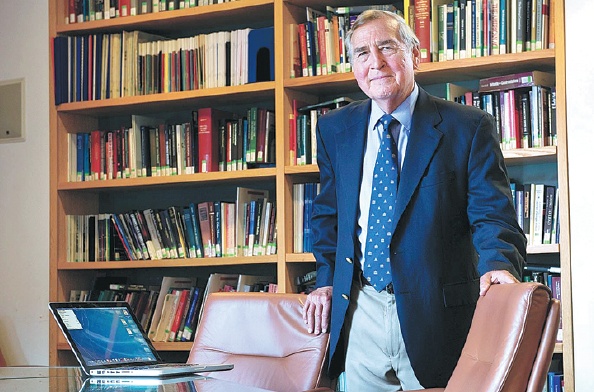
1958-1962: BA, magna cum laude, in history, Harvard University
1962-64: BA and MA, first class honors in philosophy, politics and economics, University of Oxford
1964-68: PhD in political science, Harvard University
AWARDS
US Department of Defense's highest civilian award
Distinguished Public Service Medal
2009: NAS Award for Behavior Research Relevant to the Prevention of Nuclear War (National Academy of Sciences)
CAREER
1968-present: Professor at Harvard University
1974-1984: Member of the Trilateral Commission
1977-1989: Dean of the John F. Kennedy School of Government
1985-87: Special adviser to the Secretary of Defense under US President Ronald Reagan
1993-94: Assistant secretary of defense for policy and plans
1995-2017: Director of Harvard's Belfer Center for Science and International Affairs
1996 and 2000: Organizer of the Commission on America's National Interests
Present: Advisory boards of the secretary of state, secretary of defense and the CIA director
FAMOUS WORKS
Destined for War: Can America and China Escape Thucydides's Trap? (2017)
Lee Kuan Yew: The Grand Master's Insights on China, the United States and the World (2013, with Robert Blackwill)
Nuclear Terrorism: The Ultimate Preventable Catastrophe (2004)
Essence of Decision: Explaining the Cuban Missile Crisis (1971)
Author who shone light on the thucydides trap

When asked about the changes in China that have impressed him most in the past four decades of reform and opening-up, Harvard University professor Graham Allison thought for a moment and then pointed outside his office window.
"When I gave a presentation on my Thucydides Trap book to my students, I showed the bridge that's right under my office window here - the Anderson Bridge at Harvard - and I compared it with the Sanyuan Bridge in Beijing," said Allison, author of Destined for War: Can America and China Escape Thucydides's Trap?
Allison said discussion of the renovation of the Anderson Bridge began when he was dean of Harvard's John F. Kennedy School of Government.
"And I quit being the dean in 1989," he said. "The project began in earnest in 2012. It was a two-year project; and in 2014, they said it was not finished, it would take another year. In 2015, they said, 'Not yet, there will be one more year'. 2016 they said, 'We're not telling you when it will be finished.'
"But in Beijing, the Sanyuan Bridge, which has twice as many traffic lanes as the bridge at Harvard, ... in 2015, the Chinese decided they wanted to renovate that bridge. How long did it take for the Chinese to renovate this bridge - the project that took Americans more than four years? Only 43 hours.
"This is a pretty dramatic illustration of how China has very modern construction techniques, so that could be a very good lesson for Americans to learn," Allison said.
But the contrast in the bridge renovations is just one example of the accomplishments China has made over the past 40 years, he said.
This year marks the 40th anniversary of China's reform and opening-up, a policy initiated by Deng Xiaoping at the Third Plenum of the 11th Communist Party of China Central Committee in December 1978.
These economic changes were so far-reaching that Deng described them as part of China's "second revolution".
Since then, the country has become an economic giant with the world's largest foreign reserves ($3.2 trillion) and second-largest GDP ($12 trillion), while foreign direct investment in China reached $135 billion last year.
According to Bloomberg, China's share of the global economy had grown from 1.8 percent in 1978 to 15 percent by 2017.
"I first went to China in the 1980s," Allison said. "At that time, Shanghai was hardly Shanghai today. Everybody wore the same clothes, everybody seemed to struggle with life; there were not many cars, not much major building... a poor country and not that modern."
Allison said he was invited by one of his students - the first Chinese to study for a master's at the Harvard Kennedy School. Today, more than 1,000 Chinese students are enrolled at Harvard.
"But China now, in Shanghai or Beijing or any of other hundreds of cities, is a modern wonder," Alison said. "Infrastructure, airports, subways, skyscrapers, cars, all look very modern. They are modern cities indeed.
"If you look at the opening up of peoples' minds, the improvement is also very significant. In 1978, most Chinese people never traveled abroad, but today about 10 to 15 percent of Chinese have traveled abroad. However, the biggest accomplishment of the reform and opening-up policy is what I call inverting the pyramid of poverty - in 1978, 90 percent of Chinese were living below the World Bank's extreme poverty line of $2 per day."
As a result of reform and opening-up over the past 40 years, the pyramid has been turned on its head, "and now only 1 percent live below the extreme poverty level", Allison said. "The fact that in this single lifetime, some people have seen a 50-fold rise in their standard of living is amazing," he added.
According to Chinese government statistics, 250 million people in rural areas lived below the national poverty line in 1978. By the end of last year, the figure had fallen to 30 million.
In 2000, the United Nations announced eight millennium development goals, and at the top of that list was to halve the number of people living in extreme poverty before 2015. Just four years later, in 2004, Robert Zoellick, then president of the World Bank, declared that "China's efforts alone" had put the world on track to achieve this goal.
"Between 1981 and 2004, China succeeded in lifting more than half a billion people out of extreme poverty," Zoellick said. "This is certainly the greatest leap to overcome poverty in history."
In 2010, five years ahead of deadline, Zoellick declared mission accomplished, thanks primarily to China's success.


